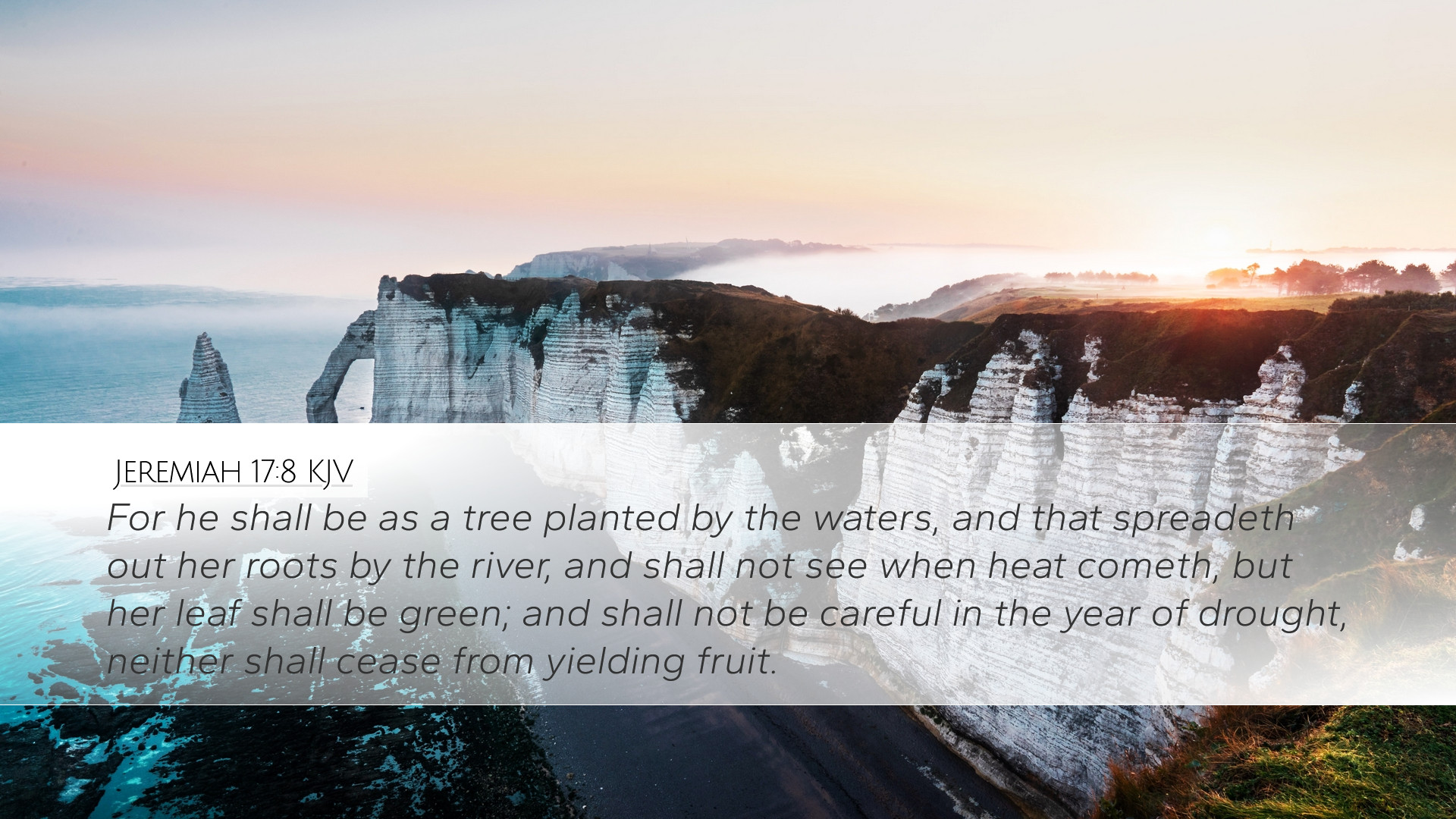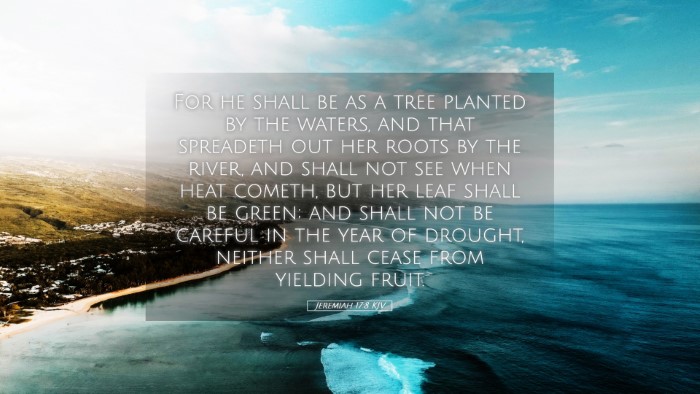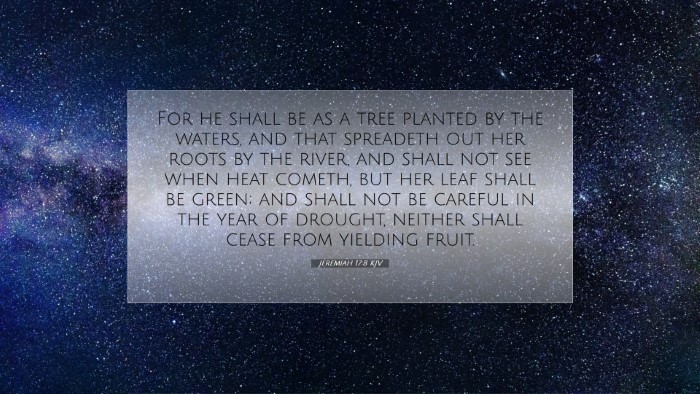Commentary on Jeremiah 17:8
Verse: "For he shall be as a tree planted by the waters, and that spreadeth out her roots by the river, and shall not see when heat cometh, but her leaf shall be green; and shall not be careful in the year of drought, neither shall cease from yielding fruit."
Introduction
This verse from Jeremiah encapsulates a powerful metaphor of reliance and resilience. The imagery of a tree planted by waters illustrates the profound blessings that come from trusting in God. The following commentary draws from the insights of notable public domain commentators such as Matthew Henry, Albert Barnes, and Adam Clarke, providing a comprehensive understanding beneficial for pastors, students, theologians, and scholars.
Contextual Overview
Jeremiah, often referred to as the weeping prophet, delivers messages of warning and judgment against the backdrop of Judah's disobedience. This particular verse is embedded in a larger discourse on the heart's trust and the significance of divine dependency as opposed to reliance on human strength.
General Theme
The overall theme of Jeremiah 17 highlights the contrasts between the blessed and the cursed. The blessed is described as one who trusts in the Lord, much like a tree rooted in nourishing waters, strongest during times of adversity.
Commentary Insights
Matthew Henry's Perspective
Matthew Henry interprets this verse as a depiction of the security and prosperity that accompany those who place their trust in God. He notes that:
- Planted by the Waters: The metaphor of a tree positioned beside water signifies stability and sustenance. A tree thrives when its roots are nourished, just as believers flourish under the influence of divine grace.
- Spreading Roots: The spreading of roots symbolizes growth and the ability to withstand challenges. A deep-rooted faith offers strength and nourishment in parched times.
- Response to Heat and Drought: Here, Henry emphasizes that the person who trusts in God will not be alarmed by the heat of trials or the drought of difficulty, illustrating an unwavering spirit amidst adversity.
- Yielding Fruit: The assurance of continued fruit-bearing indicates that genuine faith leads to spiritual productivity regardless of external circumstances.
Albert Barnes' Contributions
Albert Barnes expands on the metaphorical language employed by Jeremiah. He provides detailed insights, including:
- Tree as a Symbol: Barnes correlates the tree with a believer infused with divine bounty and rooted in the Word of God. The stability of the tree reflects the stability of one whose faith is anchored in God.
- Expectations of Blessings: He notes that the process of trusting the Lord involves an assurance that the individual will be nourished and protected from inevitable trials.
- Maturity in Adversity: Barnes asserts that the growth of fruit in dry years illustrates God's power to enable believers to prosper spiritually even in the worst of circumstances.
Adam Clarke's Analysis
Adam Clarke's exposition revolves around the implications of trust and the characteristics of true faith:
- The Dynamic Relationship with God: Clarke emphasizes that the tree represents those who are in a living relationship with God—constantly drawing strength from the "waters" of God's grace.
- Resilience against Despair: He suggests that believers remain unperturbed during crises because of their profound connection with God, akin to a tree thriving irrespective of seasonal changes.
- Abundant Fruitfulness: Clarke notes that the continual bearing of fruit is not limited to personal spiritual growth but extends as an impact on community and family.
Theological Implications
This verse provokes deep theological inquiry into the nature of faith and dependence on God. The imagery invites reflection on the quality of one's relationship with God and challenges readers to assess whether they are firmly rooted in faith or swayed by worldly distractions and uncertainties.
Faith as a Foundation
The tree metaphor explicitly illustrates that a well-founded faith produces resilience and sustainability:
- Grounded in Truth: Just as the roots of a tree absorb nourishment from the soil, believers draw strength from Scripture, which sustains them through trials.
- Community Impact: A healthy believer can contribute positively to their community, mirroring how trees benefit their ecosystem.
Comfort in Trials
Jeremiah 17:8 offers comfort that faith provides protection and assurance during uncertain times. This verse should encourage believers that their trust in God yields fruits of joy, serenity, and strength, regardless of external conditions.
Application for Today
For pastors, students, and theologians, the core message remains relevant. The following applications may be considered:
- Emphasize Spiritual Growth: Encourage congregations to nurture their spiritual roots through prayer, study, and community, leading to robust faith.
- Teach Resilience: Offer teachings on how to cultivate peace and assurance in God during life's droughts and trials.
- Foster a Community of Support: Create environments that foster mutual encouragement and growth among believers.
Conclusion
Jeremiah 17:8 serves as an enduring testament to the blessings of placing one’s trust in the Lord. Through the combined insights of Matthew Henry, Albert Barnes, and Adam Clarke, the imagery of a tree planted by the waters urges us to examine our relationship with God. It challenges us to draw deeply into the life-giving presence of our Creator, ensuring our roots are firmly established. Whether in times of abundance or drought, the promise remains: those who trust in the Lord will not only endure but also thrive.


